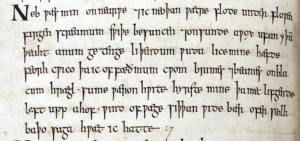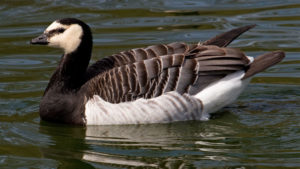Having recently translated Riddle 10 from the Exeter Book (Exeter Cathedral Library MS 3501) in my recent blog on esotericism in a sequence of Old English riddles (“Encoded References in Exeter Book Bird-Riddles“), I have decided to add my translation and recitation of this poetic enigma for our ongoing medieval poetry translation and recitation project. I accept the Latin solution bernaca, (a term for “barnacle goose”) as the poem’s solution based on parallel descriptions of a legend regarding the bird’s marvelous generation on drift wood (where water and wood meet) found in Gerald of Wales’ Topographia Hiberniae, which describes the “marvelous” bird in similar terms.

Old English Riddle 10 (solution: bernaca):
Neb wæs min on nearwe , ond ic neoþan wætre,
flode underflowen, firgenstreamum
swiþe besuncen, ond on sunde awox
ufan yþum þeaht, anum getenge
liþendum wuda lice mine .
Hæfde feorh cwico, þa ic of fæðmum cwom
brimes ond beames on blacum hrægle.
Sume wæron hwite hyrste mine,
þa mec lifgende lyft upp ahof,
wind of wæge, siþþan wide bær
ofer seolhbaþo. Saga hwæt ic hatte.

“Exeter Book Barnacle Goose-Riddle:” A Modern English Translation by Richard Fahey:
“My beak was in narrowness, and I was beneath the water, I was subsumed by the ocean, I was sunk deep in the briny current. I awoke in my swimming, covered over by waves, near those travelers of wood, with my body. I had a living spirit, when I came from the bosom of sea and tree in black garments. Some of my decorations were white, when the breeze heaved me up, living, the wind from the wave, after that it bore me widely across the seal-bath. Say what I am called.”
Richard Fahey
PhD in English
University of Notre Dame
